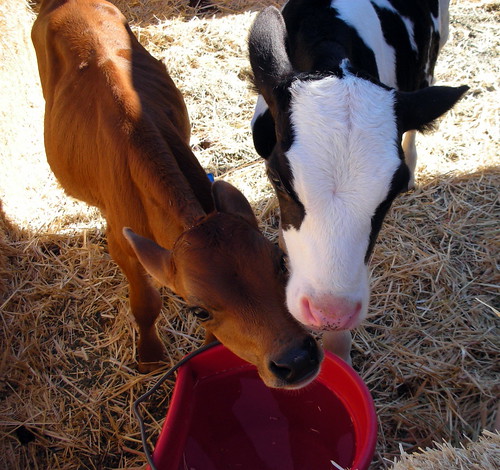Then They Came for My Cows
Imagine that the seat belt law were expanded tomorrow. Imagine that it not only required you to wear a seat belt, but each of your seat belts had to be marked with a number and that number registered with a government agency. Each time a seat belt left your property, you would have to notify that government agency when it left, where it went, and for how long. You would also have to record every other person who used that seat belt. All this would be recorded in a master database, so that any time a seat belt failed to save someone in an accident, it could be traced back to everyone who ever used it or owned it, to try to determine what went wrong.
That’s pretty much what NAIS is like for small farmers. If you haven’t heard of it, NAIS is the National Animal Identification System. The idea is that every animal is tracked by a microchip throughout its lifetime, so if there is a disease outbreak somewhere, the government can quickly determine where the diseased animals have been and get quarantines or kills done quickly.
That sounds very noble, but it’s another one of these one-size-fits-all systems that is only necessary in a world of anonymous food sources, cheap imports, and huge distributors and processors. They want to have food shipped across oceans and continents—sometimes more than once before it reaches your table—and be able to claim it’s safe. In their ideal system, customers, grocery stores, and processors don’t have to pay any attention to where their food comes from or how it’s handled; momma government will take care of us all.
That’s unrealistic and unnecessary. There’s no way they can ever make a distribution system that large completely safe (see the E. coli contamination of spinach and tomatoes in recent years and the lead showing up in Chinese products); and if livestock were simply raised, processed, and eaten locally, there would be no need for that kind of tracking anyway. If you buy a hog from a local farmer and someone gets sick, you already know where it came from; you don’t have to track it to a food distributor in Dayton, then to a meat packer in Detroit, then to a farm outside Toronto or Villahermosa.
There are three groups that want NAIS:
- The government agencies who get to expand their budgets to administer it.
- The big processors who figure it’ll take some of the liability off them if contamination can be tracked past them back to the producer.
- Supposed farmer organizations who get most of their money from the processors.
No one else wants it. Farmers are realizing they don’t want it, despite a massive ad campaign by government to try to convince them it’s for their own good. Consumers don’t even know about it. So only a small number of people want it, but they have plenty of time and money to invest in it, so it’s gradually been implemented.
Of course, when they were pitching it to farm organizations to get their support in lobbying politicians for it, they said it would never be applied to hobby farmers, or to the kid with two goats who wants to take them to the fair. Yet last year, the county fair here was going to require NAIS identification of every animal shown until there was an uproar about it. They backed down, but said that was just for that year. The idea was floated again this year, but there was still too much resistance. They’ll keep bringing it up each year, waiting for people to wear down and give up.
A bill has been introduced in the Illinois Senate to try to put a stop to this nonsense. Illinois already has a state-wide tracking system; it just doesn’t involve expensive microchips and federal bureaucrats. It’s usually pretty hard to stop programs like this once they have offices and full-time employees to keep pushing them, but it’s possible if enough people get really offended, so there’s hope.
What got me writing about this was a piece about Wendell Berry and NAIS, the poet and writer who’s written a lot about the loss of America’s small farmers and agricultural heritage to the corporate globalists. I had to smile at this quote from Mr. Berry:
If you impose this program on the small farmers, who are already overburdened, you’re going to have to send the police for me. I’m 75 years old. I’ve about completed my responsibilities to my family. I’ll lose very little in going to jail in opposition to your program – and I’ll have to do it. Because I will be, in every way that I can conceive of, a non-cooperator.
Well said.
If you enjoyed this article, why not rate it and share it with your friends on Twitter, Facebook, or StumbleUpon?
loading...

